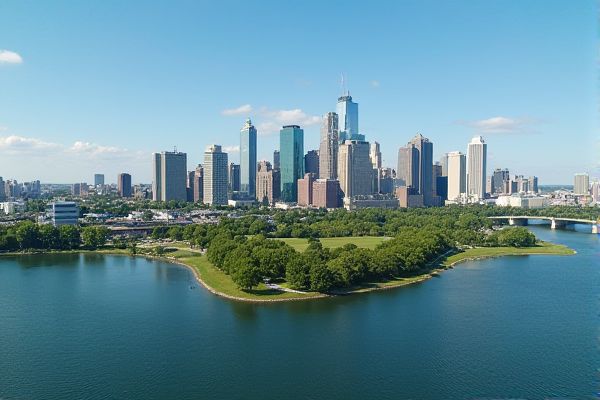
Transportation and commuting in Michigan: Extensive highways and interstates network. Public transit in major cities available. Amtrak services statewide connections. Detroit Metro Airport for international flights. Carpool options in urban areas. Cycling-friendly routes expanding. Winter weather affects driving conditions. Michigan lefts for safer turns. Long-distance bus services present. Toll-free roads statewide.
Extensive highways and interstates network.
Michigan has an extensive network of highways and interstates, including four mainline interstate highways (I-69, I-75, I-94, and I-96) and several auxiliary routes. The state's geography, particularly its peninsula shape, influences the design and feasibility of Intrastate Highways, with I-96 being a notable example that runs exclusively within Michigan.
Public transit in major cities available.
In Michigan, major cities boast comprehensive public transit systems, including Ann Arbor's TheRide, Detroit's DDOT and People Mover, Flint's MTA, Grand Rapids' The Rapid, and others, offering bus, rail, and ferry services. These transit initiatives connect residents to their communities and play a vital role in supporting local economic growth. To learn more about these services and the impact they have across the state, visit the Michigan Public Transit website.
Amtrak services statewide connections.
Michigan has three Amtrak routes, namely the Wolverine, Blue Water, and Pere Marquette, which connect Chicago to various cities in Michigan, including Pontiac, Port Huron, and Grand Rapids, with multiple intermediate stations across the state. These routes are part of the Amtrak Midwest brand and are supported by the Michigan Department of Transportation, which also oversees the maintenance and capital improvements of the rail corridors. For more detailed information, visit the Amtrak Guide to learn about the stations and services available across Michigan.
Detroit Metro Airport for international flights.
Detroit Metropolitan Airport (DTW) is a major hub for international flights, offering non-stop flights to over 125 destinations in 18 countries, including Europe, the Caribbean, China, and South Korea, with Delta being the largest airline operating from the airport. The airport is divided into two terminals, McNamara (Terminal EM) and North (Terminal N), and provides various amenities and services to facilitate smooth travel. For more information, you can visit the Detroit Metropolitan Airport website to explore more about the facilities and flight services available.
Carpool options in urban areas.
In Michigan's urban areas, carpool options include the MichiVan program, which provides fully insured passenger vans for commuter groups, and local rideshare offices that help match individuals for carpooling and vanpooling. These services offer various benefits, such as reduced travel costs and a guaranteed ride home for emergencies. For more comprehensive information on these programs and services, visit the Michigan Department of Transportation website.
Cycling-friendly routes expanding.
Michigan is expanding its cycling-friendly routes with existing US Bike Routes such as USBR-10, USBR-20, and USBR-35, and planned routes like USBR-8, USBR-25, USBR-36, and USBR-37, which will utilize both on-road and off-road trails to enhance cycling infrastructure across the state. The Marquette Greenway Trail project is underway, aiming to connect Chicago to Southwest Michigan with a 58-mile trail, expected to be complete by 2027, and offering significant economic and recreational benefits to the region. Meanwhile, Detroit is enhancing its cycling infrastructure with the expansion of bike paths and greenways, including the International Riverwalk, Dequindre Cut, and the Joe Louis Greenway, which are connecting various neighborhoods and cities, promoting sustainable transportation and economic growth.
Winter weather affects driving conditions.
Winter weather in Michigan significantly affects driving conditions, with icy, snowy, or slushy roads leading to increased crash risks. Drivers are advised to drive slowly, maintain their vehicles, clear snow and ice from their cars, and follow specific safety tips to navigate safely around snowplows and handle emergencies. For comprehensive guidelines and resources on how to remain safe during the harsh winter months, visit the Winter Driving Safety Programs provided by the Michigan State Police. Taking these precautions can significantly reduce the likelihood of accidents and ensure a safer journey for everyone on the road.
Michigan lefts for safer turns.
Michigan Lefts, or Indirect Left Turns, enhance safety and traffic flow by eliminating direct left turns, significantly reducing crashes by 30-60%, relieving congestion, and improving access for all road users, including pedestrians, bicyclists, and commercial vehicles. These innovative traffic solutions are detailed further on the Michigan Department of Transportation website, which provides comprehensive insights into how these engineered modifications contribute to a safer and more efficient transportation network across Michigan.
Long-distance bus services present.
In Michigan, long-distance bus services are provided by companies such as Greyhound and Indian Trails, offering extensive networks with numerous locations in North America, including routes connecting various cities within Michigan and to other states and Canada. Indian Trails operates several subsidized routes, including the Huron, Sleeping Bear, Hiawatha, Superior, and Straits routes, covering a wide range of destinations across the state.
Toll-free roads statewide.
Michigan currently does not have toll roads, but it does have toll bridges and tunnels. A recent bill aims to implement a Tolling Enforcement Program for certain international bridges and tunnels, but it does not introduce tolls on state roads. For more information on this legislative development, you can visit the article on Landline Media for comprehensive insights into Michigan's tolling reforms.
